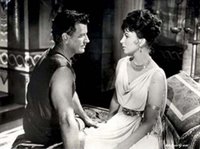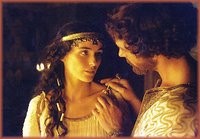Perhaps Esther's story is more palatable to a society which, by en large, still views beauty as a woman's primary asset. Depicting the life of a biblical heroin who is a warrior / prophetess / leader is perhaps more uncomfortable than the life of a woman who uses hospitality and beauty to get around her man (female archetype anyone). Furthermore most Christians leaders / father would probably rather their daughters emulated the more pliant Esther, than the more dominant Deborah. They are both brave and faithful women of God, and both stories need to be told, but I wonder what it says about us that the one story is preferred again and again over the other.
Anyway, I wanted to make a few brief comments on the films about Esther that have been made thus far.
 Early Silents
Early Silents1910 and 1911 saw an explosion of Old Testament films on the silver screen. More films based on the Hebrew bible were made in those two years than had been made since the birth of the medium. So it's no surprise that we find four films being made about Esther in that time period alone. Esther, Esther and Mordecai and The Marriage of Esther were both released in 1910, followed hot on their heels by Esther: A Biblical Episode in 1911. Two more films, both simply titled Esther followed in 1913 and 1916. The Undertow, (also known as Esther of the People) was a "modern" day allegory of the story, featuring a factory owner called Mr. King and one of his foremen named Hammond. Three years later there was a German film called Das Buch Esther starring Stella Harf (left).
 Golden Era
Golden EraDuring the first 40 years of sound, only two films were made about Esther. The first, produced in 1948, was Queen Esther directed by John T. Coyle who went onto direct The Living Christ Series (detailed collection of posts here). Twelve years later, a young Joan Collins took the lead role in Esther and the King (1960). I'm actually yet to see either, though I write knowing that I have Esther and the King waiting on DVD.
Television Era
Esther fared reasonably well in the "TV era" - notably the 70s where 3 films, the dutch Esther (1975), The Greatest Heroes of the Bible : The History of Esther (1978) and The Thirteenth Day: The Story of Esther (1978) covered the story. The latter film starred Olivia Hussey, straight after she had finished playing Mary the mother of Jesus in Jesus of Nazareth. More recently there have been a number of modern versions of the Story
 Esther (Dir: Amos Gitai)
Esther (Dir: Amos Gitai)Probably my favourite of all the films about Esther, this semi-modernised version of the story, deliberately challenges both the conventions of cinema, and the standard reading of the text. Gitai frequently "breaks the fourth wall" with characters in the story directly addressing the camera. Ultimately this results in the final sequence where the actors tell you about their relationship with the text they have been exploring, and how they see the cycle of revenge that exists in the text as continuing today. For them the story epitomises the problems that remain in the middle east today. The film also shocks in the way it presents the harem. Whether this is historically accurate is questionable, but it certainly bulldozes through the sanitised Sunday school version of the story. There is more on this film here, here, and here (scroll to end for that one).
 The Bible Collection: Esther (dir:Raffaele Mertes)
The Bible Collection: Esther (dir:Raffaele Mertes)The bible collection has filmed more biblical stories than anyone else, and so unsurprisingly this is one of the stories they included. The film perhaps gives the most realistic portrayal of what it meant for Esther to be taken from her familiar surroundings and placed in his harem. Her one night with the king is shown as one she dreads, losing her virginity to a stranger, in ways against her will. It's a strong point of an otherwise unremarkable film. Louise Lombard's performance as the eponymous heroin swings between convincing and sensitive, and melodramatic. It's worth watching, if only because it has wider appeal than Gitai's film, but still remains challenging to the glamour/fantasy version that perpetuates in the minds of many. The film is reviewed here and here
 Veggie Tales
Veggie TalesAt the other end of the scale, the Veggie tales series sanitises the story to such an extent that it removes all dramatic tension from the film whatsoever. The Jews aren't at risk of being wiped out by a jealous megalomaniac. They simply are in danger of being exiled to the island of perpetual tickling. I must admit I don't understand the approach of this series and other attempts to purge the bible of mentions of death, unpleasantness and other aspects of real life. Sooner or later children will learn about death, and that it's in the bible, and the longer this goes on, the harder it will hit them.
Regarding the current version, it seems to be most similar to the Bible Collection version, certainly in terms of production values the sets seem to be similarly glossy, and lavish. It's encouraging that the story mentions Xerxes' harem, but it remains to be seen whether the film will go beyond a glamourised shallow version of the story to unearth some of the more challenging and controversial aspects of the story. For what it's worth the music on the trailer (Enya, in upbeat mode) is not encouraging. There is an additional article on the film here.
Matt
No comments:
Post a Comment